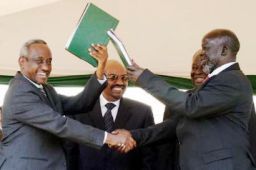Donors, Sudan to review CPA implementation next week
March 14, 2007 (WASHINGTON) — Western donors and the Sudanese government, including former southern rebels, will meet in the capital Khartoum next week to review progress under a 2005 peace accord between the north and south, the World Bank said on Wednesday.
 But the meeting of the so-called Sudan Consortium on March 20 in Khartoum and March 21 in southern Juba is being overshadowed by tensions between donors and Khartoum over the crisis in the western Darfur region.
But the meeting of the so-called Sudan Consortium on March 20 in Khartoum and March 21 in southern Juba is being overshadowed by tensions between donors and Khartoum over the crisis in the western Darfur region.
At the insistence of donors, a separate meeting on Darfur will take place on March 19 in Khartoum, which comes as the United States considers further sanctions against Sudan’s government, which would restrict international transactions in dollars.
Such a move would likely impact Sudan’s oil-based economy, where countries like China, India and Malaysia are the most active.
U.S. special envoy to Sudan, Andrew Natsios, is expected to attend the meetings in Khartoum.
The 2005 peace deal ended two decades of civil war between the Islamist government in Khartoum in the north and mostly animist and Christian rebels in the south. Two million people, mostly in the south, died in the conflict and more than four million were uprooted.
“The meeting occurs at a critical time,” World Bank spokesman Tim Carrington told Reuters. “Participants will take stock of the progress in implementing the 2005 comprehensive peace agreement and will address priorities for the months ahead,” he added.
There is deep concern, especially among former rebels in the south, that tension between the West and Khartoum over Darfur could affect the north-south deal, especially if the United States and donors begin restricting aid or increasing sanctions.
The United States, Britain and others are pressuring Khartoum to agree to an interim U.N. force to boost African troops already in Darfur, where at least 200,000 people have died, 4 million need emergency aid and 2.5 million are in makeshift camps.
Sudanese President Omar Hassan al Bashir has called the proposed deployment of U.N. troops an attempt to colonize the country.
The four-year Darfur conflict began when rebels from non-Arab tribes took up arms, complaining of decades of neglect and discrimination by the Arab-denominated Khartoum government. The conflict has spilled into neighboring Chad and Central African Republic.
Meanwhile, implementation of the 2005 north-south deal has been slower-than-expected. Southern Sudan accuses Khartoum of reneging on key areas such as sharing of oil revenue and drawing a common border through an area straddling Sudan’s richest oil reserves.
The World Bank manages two trust funds to which Western donors have committed more than $500 million in aid for Sudan, with emphasis on rebuilding of the war-scarred south that is one of the most impoverished regions in Africa.
The World Bank is unable to resume full operations in Sudan until the government settles the $422 million in arrears it owes the bank and $1.7 billion to the International Monetary Fund.
It is unlikely donors will be willing to restructure or write off Sudan’s arrears until there is a real sense that the Darfur crisis can be resolved.
(Reuters)
